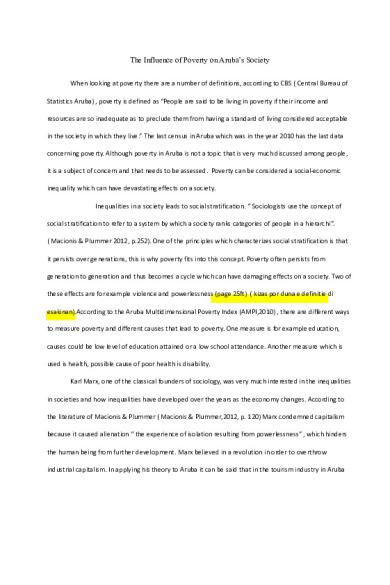The Influence of Poverty on Aruba PDF

| Title | The Influence of Poverty on Aruba |
|---|---|
| Author | Kimberly Franken |
| Course | Introduction to research methodology |
| Institution | University of Aruba |
| Pages | 2 |
| File Size | 63.1 KB |
| File Type | |
| Total Downloads | 87 |
| Total Views | 147 |
Summary
to see from a sociological view...
Description
The Influence of Poverty on Aruba’s Society When looking at poverty there are a number of definitions, according to CBS ( Central Bureau of Statistics Aruba) , poverty is defined as “People are said to be living in poverty if their income and resources are so inadequate as to preclude them from having a standard of living considered acceptable in the society in which they live.” The last census in Aruba which was in the year 2010 has the last data concerning poverty. Although poverty in Aruba is not a topic that is very much discussed among people, it is a subject of concern and that needs to be assessed. Poverty can be considered a social-economic inequality which can have devastating effects on a society. Inequalities in a society leads to social stratification. “ Sociologists use the concept of social stratification to refer to a system by which a society ranks categories of people in a hierarchi”. ( Macionis & Plummer 2012, p.252). One of the principles which characterizes social stratification is that it persists over generations, this is why poverty fits into this concept. Poverty often persists from generation to generation and thus becomes a cycle which can have damaging effects on a society. Two of these effects are for example violence and powerlessness (page 254) ( kizas por duna e definitie di esakinan).According to the Aruba Multidimensional Poverty Index (AMPI,2010) , there are different ways to measure poverty and different causes that lead to poverty. One measure is for example education, causes could be low level of education attained or a low school attendance. Another measure which is used is health, possible cause of poor health is disability. Karl Marx, one of the classical founders of sociology, was very much interested in the inequalities in societies and how inequalities have developed over the years as the economy changes. According to the literature of Macionis & Plummer ( Macionis & Plummer,2012, p. 120) Marx condemned capitalism because it caused alienation “ the experience of isolation resulting from powerlessness” , which hinders the human being from further development. Marx believed in a revolution in order to overthrow industrial capitalism. In applying his theory to Aruba it can be said that in the tourism industry in Aruba
there are many employees working long hours for minimal wages which is what Karl Marx points out in his theory. On the other hand , Marx’s theory can be contradicted because in Aruba there are plenty of opportunities for growth within the tourist industry sector and the industry is bound to worker-unions who continually fight for worker’s rights.
The United Nations
General Assembly has set 17 global goals in 2015 to basically save the planet. These goals are to be met by the year 2030 in order to have sustainability. Aruba is also partaking in this process to reach this goal. Number 1 on the list for these goals is “ No Poverty”. Aruba being part of this shows that poverty is on the list of concern and that something needs to be done in order to reduce poverty and to reach the goal of having no poverty at all on the island of Aruba.
To conclude it can be said that
poverty is a cycle that persists over generations and produces a negative impact on a society if not dealt with. Education is key in diminishing poverty and Aruba is determined to put an end to the poverty cycle and reaching a sustainable way in the overall social and economical progress on the island of Aruba....
Similar Free PDFs

Essay on poverty - Grade: B
- 4 Pages

Theories of Poverty
- 9 Pages

Changing face of poverty
- 15 Pages

Ch07 Governmental Influence on Trade
- 21 Pages
Popular Institutions
- Tinajero National High School - Annex
- Politeknik Caltex Riau
- Yokohama City University
- SGT University
- University of Al-Qadisiyah
- Divine Word College of Vigan
- Techniek College Rotterdam
- Universidade de Santiago
- Universiti Teknologi MARA Cawangan Johor Kampus Pasir Gudang
- Poltekkes Kemenkes Yogyakarta
- Baguio City National High School
- Colegio san marcos
- preparatoria uno
- Centro de Bachillerato Tecnológico Industrial y de Servicios No. 107
- Dalian Maritime University
- Quang Trung Secondary School
- Colegio Tecnológico en Informática
- Corporación Regional de Educación Superior
- Grupo CEDVA
- Dar Al Uloom University
- Centro de Estudios Preuniversitarios de la Universidad Nacional de Ingeniería
- 上智大学
- Aakash International School, Nuna Majara
- San Felipe Neri Catholic School
- Kang Chiao International School - New Taipei City
- Misamis Occidental National High School
- Institución Educativa Escuela Normal Juan Ladrilleros
- Kolehiyo ng Pantukan
- Batanes State College
- Instituto Continental
- Sekolah Menengah Kejuruan Kesehatan Kaltara (Tarakan)
- Colegio de La Inmaculada Concepcion - Cebu











